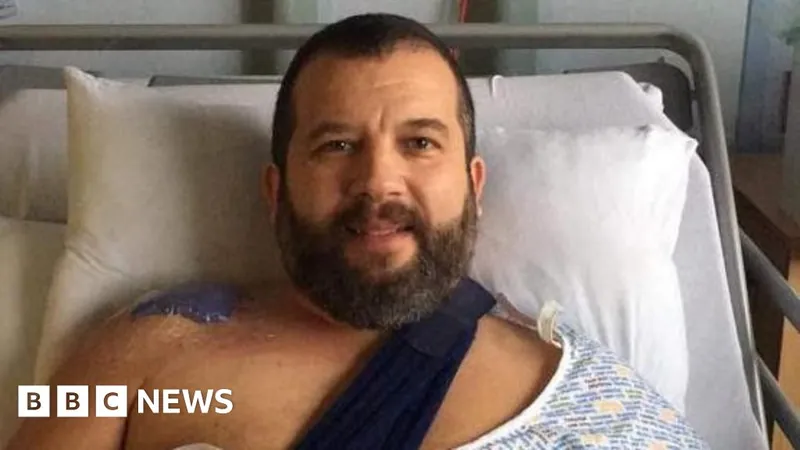
The Dark Side of Fluoroquinolone Antibiotics: One Man's Struggle After Severe Reactions
2024-12-20
Author: Siti
Introduction
In a life-changing turn of events, John Marshall from Kirkcaldy, Scotland, saw his passion for running replaced with debilitating pain following a troubling reaction to fluoroquinolone antibiotics in 2017. At just 51, his overall health suffered dramatically within days of starting the medication, which is often prescribed to treat bacterial infections.
Initial Reactions
'My joints felt like they were on fire—every single one of them,' John recalls of his ordeal. From fingers to toes, the pain was relentless, marked by intense stabbing sensations and uncontrollable muscle twitching. This experience is what many refer to as being ‘floxed,’ a term used among campaigners advocating awareness about the hidden dangers of fluoroquinolones.
Ongoing Struggles
Fast forward seven years, John still battles chronic pain and relentless muscle spasms, living a life radically altered by an antibiotic that is supposed to save lives. While fluoroquinolone antibiotics, which include drugs such as ciprofloxacin and moxifloxacin, can be beneficial in treating specific bacterial infections, they are not without risks. New guidance from UK health authorities recommends their use only in limited circumstances, particularly when other treatments are unsuitable, due to the potential for serious and sometimes irreversible side effects.
Health Authority Warnings
The Medicines and Healthcare products Regulatory Agency (MHRA) has significantly amplified warnings surrounding fluoroquinolones, linking them to severe complications including tendon ruptures, severe muscle pain, and even psychological issues like suicidal thoughts—overlooked consequences in the past.
Expert Concerns
Despite these warnings, experts are dismayed by the continued over-prescription of these antibiotics. Prof. Neal Millar, one of the few in the UK specializing in the treatment of fluoroquinolone toxicity, expresses concern that the message is not reaching general practitioners effectively. With his clinic reporting an influx of patients suffering the consequences of these drugs, he emphasizes the need for better communication about the risks.
Prescription Statistics
In 2023, fluoroquinolones made up only 2.4% of all antibiotics used in Scotland, indicating some progress. However, thousands still rely on these medications, leading to troubling statistics. Cases of debilitating symptoms have surged, and the true extent of the problem remains unclear due to issues with reporting side effects. The MHRA estimates adverse reactions can impact one in ten users, but underreporting complicates the situation.
Personal Experience
After being prescribed fluoroquinolones during a hospital stay for a vasectomy-related infection, John initially received minimal guidance about potential side effects. Symptoms persisted long after ceasing the medication. He recounts the horror of waking up every night with debilitating spasms that rendered him unable to straighten his legs due to unbearable pain. An MRI just two years later revealed a ruptured bicep tendon, leading to surgery—a stark reminder of how these antibiotics changed his life forever.
Community of 'Floxies'
John is now part of a growing international community of ‘floxies’ who share their experiences of suffering from these drugs. Many, like John, express frustration over a lack of guidance on how to report side effects. The MHRA continues to encourage reporting through their Yellow Card scheme, yet experts believe that many affected patients are left unheard.
Regulatory Guidance
Health regulatory bodies such as Healthcare Improvement Scotland recognize that serious side effects may “rarely occur.” They advise that fluoroquinolones should only be prescribed when testing for antibiotic resistance or when first-line treatments fail. Dr. Alison Cave, MHRA's chief safety officer, emphasizes that all concerns raised are taken seriously and monitored.
Looking Forward
As John continues his treatment journey at Prof. Millar's clinic, he remains an optimist, holding onto the hope of recovery. 'I push myself sometimes, maybe too far,' he admits. 'But I refuse to accept that I’m disabled. I believe recovery is possible.' As awareness grows, it is vital for patients and healthcare professionals to engage in open discussions about the risks and benefits of antibiotics, ensuring that no one else has to endure what John has faced.


 Brasil (PT)
Brasil (PT)
 Canada (EN)
Canada (EN)
 Chile (ES)
Chile (ES)
 España (ES)
España (ES)
 France (FR)
France (FR)
 Hong Kong (EN)
Hong Kong (EN)
 Italia (IT)
Italia (IT)
 日本 (JA)
日本 (JA)
 Magyarország (HU)
Magyarország (HU)
 Norge (NO)
Norge (NO)
 Polska (PL)
Polska (PL)
 Schweiz (DE)
Schweiz (DE)
 Singapore (EN)
Singapore (EN)
 Sverige (SV)
Sverige (SV)
 Suomi (FI)
Suomi (FI)
 Türkiye (TR)
Türkiye (TR)